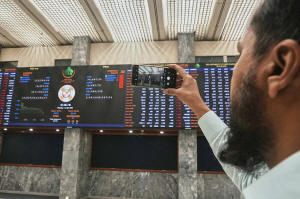Mideast stock markets tumble as US tariffs and low oil prices squeeze
energy-producing nations
[April 07, 2025] By
JON GAMBRELL
DUBAI, United Arab Emirates (AP) — Middle East stock markets tumbled
Monday as they struggled with the dual hit of the United States' new
tariff policy and a sharp decline in oil prices, squeezing
energy-producing nations that rely on those sales to power their
economies and government spending.
Benchmark Brent crude is down by nearly 15% over the last five days of
trading, with a barrel of oil costing just over $63. That’s down nearly
30% from a year ago, when a barrel cost over $90.
That cost per barrel is far lower than the estimated break-even price
for Saudi Arabia and most other countries producing energy in the Middle
East. That's coupled with the new tariffs, which saw the Gulf
Cooperation Council states of Bahrain, Kuwait, Oman, Qatar, Saudi Arabia
and the United Arab Emirates hit with 10% tariffs. Other Mideast nations
face higher tariffs, like Iraq at 39% and Syria at 41%.
“With these measures and the expected retaliatory measures that could be
adopted by other countries, the stability and predictability of
international trade could be undermined,” the accounting firm PwC said
in an advisory to its Mideast clients.
Losses sweep region
The Dubai Financial Market exchange fell 6% after it opened for the
week, with market leader Emaar Properties down 9%. The Abu Dhabi
Securities Exchange fell 4%.

Markets that opened Sunday saw losses as well. Saudi Arabia's Tadawul
stock exchange fell over 6% in trading then, with further losses of 3%
after opening Monday. The giant of the exchange, Saudi Arabia's
state-owned oil company Aramco, fell over 5% on its own on Sunday, with
more losses Monday, wiping away billions in market capitalization for
the world's sixth-most-valuable company.
The drop in Aramco, whose shares also power Crown Prince Mohammed bin
Salman's expansive plans to reshape the kingdom's economy, ties directly
back to the overall price of oil.
Last week, OPEC+ members Algeria, Iraq, Kazakhstan, Kuwait, Oman,
Russia, Saudi Arabia and the UAE agreed to speed up the introduction of
more oil into the market. This month marks the first oil production
increase by the group since 2022.
[to top of second column] |

An investor takes a picture with a cell phone of indexes and
benchmark 100 index at the Pakistan Stock Exchange (PSE), in
Karachi, Pakistan, Monday, April 7, 2025. (AP Photo/Fareed Khan)
 “OPEC+ has shifted its market
management strategy from a steady incremental increase in output to
monthly announced targets, bringing forward higher output levels for
May this year,” an analysis published Monday by the
state-majority-owned Emirates NBD Bank of Dubai said. “That will
leave oil markets grasping with additional volatility as they assess
the negative impact on global trade of the tariffs announced by the
Trump administration.”
The Qatar Stock Exchange fell over 4% Sunday and a further 2% as
trading resumed Monday. Boursa Kuwait fell over 5% on Sunday, with
slight losses again Monday.
Pakistan also struggles
The Pakistan Stock Exchange fell rapidly Monday, with Islamabad
facing 29% tariffs from the U.S. The exchange suspended trading for
an hour after a 5% drop in its main KSE-30 index.
"We may face this situation until the uncertainty ends at the global
market,” said Mohammed Sohail, the chief executive at Topline
Securities.
Pakistan’s Finance Minister Muhammad Aurangzeb said over the weekend
that Islamabad will send a delegation to the United States soon to
negotiate. The U.S. imports around $5 billion worth of textiles and
other products from Pakistan, which heavily relies on loans from the
International Monetary Fund and others.
___
Associated Press writer Munir Ahmed in Islamabad contributed to this
report.
All contents © copyright 2025 Associated Press. All rights reserved
 |